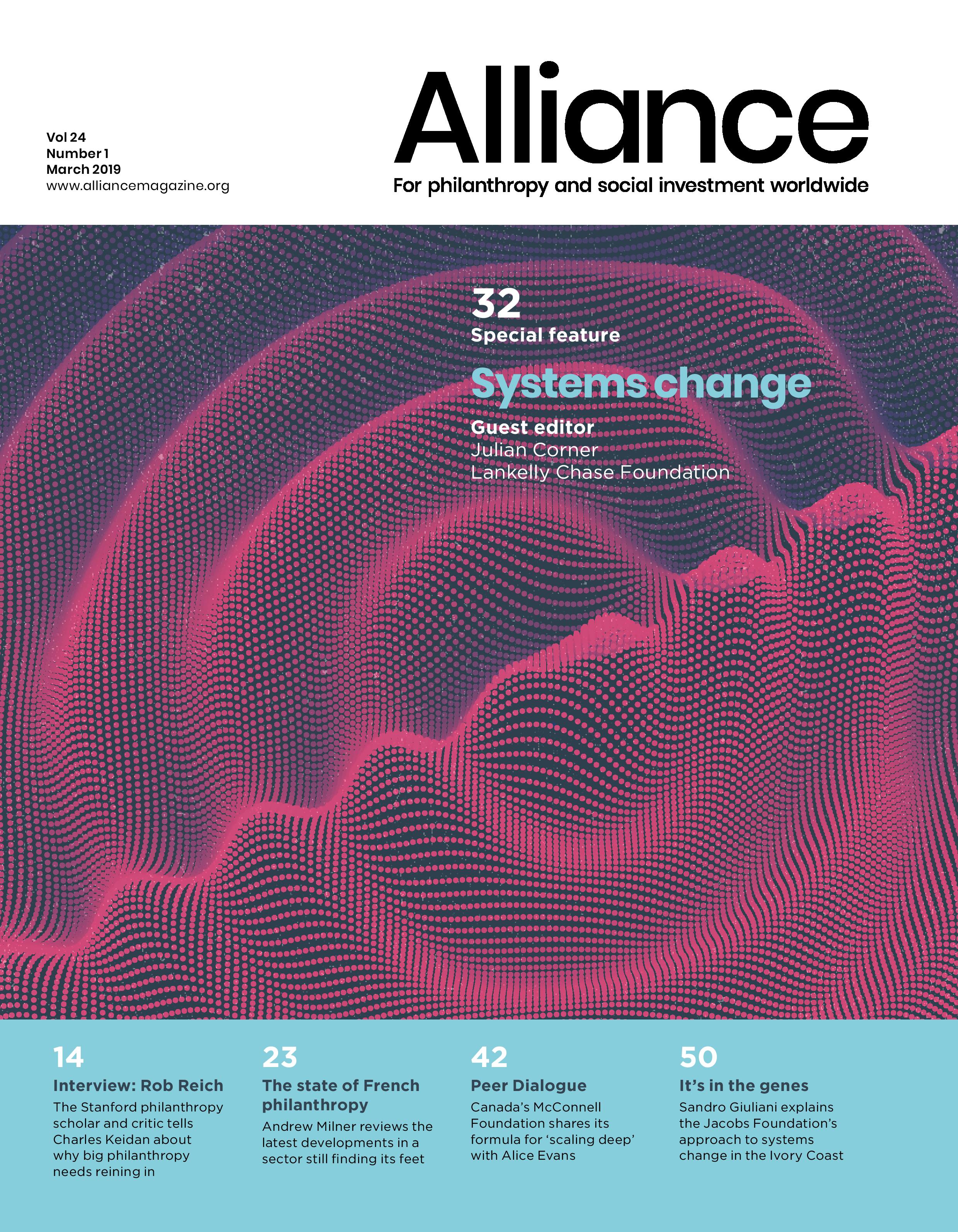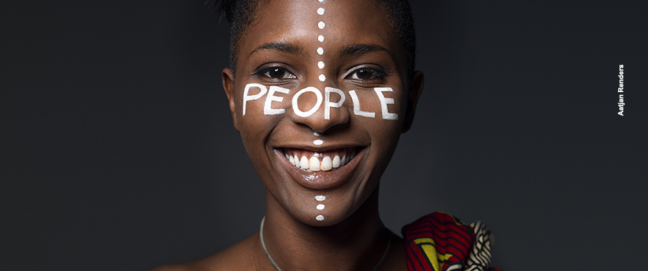The work of funders is as varied as the systems they are hoping to change. Andrew Milner profiles a selection of donors and organisations taking a more systemic approach
Bertha Foundation, UK
Founded in 2009 by pharmaceuticals multi-millionaire, Tony Tabatznik, the Bertha Foundation supports field-building and collaboration between activists, lawyers and film-makers. Through its work with storytellers, it supports not only the creation of content in many forms, but also training in media for individuals and communities. Its four film funds have enabled the making of over 200 documentaries and their promotion among communities through distribution initiatives including Dogwoof, AfriDocs and Sundance.
The foundation has also established the Bertha Justice Initiative which provides fellowships, networks and convenings. The fellowships, which have a global reach (spanning 154 countries, according to Bertha’s website) provide two-year training for social justice and movement lawyers at public interest law centres around the world.
http://berthafoundation.org
The Freedom Fund
The Freedom Fund ‘identifies and invests in the most effective frontline efforts to eradicate modern slavery in the countries and sectors where it is most prevalent’. It was set up in 2014 by Walk Free Foundation, Legatum Foundation and Humanity United. It has also benefited from ongoing support from the Children’s Investment Fund Foundation, C&A Foundation, the Stardust Fund and UBS Optimus Foundation. Working with 120 frontline organisations in eight of what it calls ‘global slavery hotspots’, scattered across India, Nepal, Ethiopia and Thailand, it claims to have liberated 20,000 people from slavery and to have placed over 45,000 at-risk children back in school. The fund also works to counter the systems that permit slavery to exist, strengthening anti-slavery infrastructure globally, engaging governments, media and the private sector in the hotspot areas and providing platforms, and information such as Slavery News Weekly for other anti-slavery initiatives. The fund is launching a Freedom Leadership Program in 2019 to support and develop a new wave of frontline practitioners, especially women practitioners.
https://freedomfund.org
Centre for Social Innovation, Germany
Research and engagement on social innovation and social entrepreneurship are the prime focus of the Centre for Social Investment and Social Innovation (CSI) at Heidelberg University in Germany.
Its inclusion here is due to its involvement in systems thinking, most notably the System Innovation Lab (SIL), which it ran with Wuppertal Institute in 2016. Its purpose was to bring together sector professionals, policymakers and representatives of interested civil society organisations to propose innovative ways towards a sustainable future for energy in Europe. It represents an attempt at ‘thinking big and being specific at the same time’, trying to understand a system, then breaking down ‘the complexity into specific steps of action for changemakers to take’, as its website puts it.
http://www.soz.uni-heidelberg.de/forschungsstelle-csi
Central Square Foundation, India
Founded in 2012, Central Square Foundation’s (CSF) mission is to transform the school education system in India, improving the learning outcomes of children, especially those from low-income communities. Notable in this respect is the Adarsh Yojana programme, launched by the state government in Rajasthan, which has suffered low levels of educational attainment. CSF has worked with the state government and with partners from the private, public and philanthropic sectors, including Boston Consulting Group, Michael & Susan Dell Foundation and Unicef, to establish schools in each of the state’s 9,895 gram panchayats (village councils), which are fully staffed schools with trained teachers and principals and providing high quality education. In keeping with its system-wide approach, the initiative focuses on improving governance processes for education, reducing teacher and school leadership vacancies, and upgrading school infrastructure, as well as improving teaching materials.
http://centralsquarefoundation.org/
Friends Provident Foundation, UK
Friends Provident Foundation (FPF) was established in 2001 following the demutualisation of Friends Provident Life, an insurance company with Quaker roots. One aspect of its work on resilient economies focuses explicitly on systems change, ‘a radical assessment of how “disruptive innovation” might change arguably the most pervasive and enduring system of all, the financial system’. Starting from the premise that financial systems have become increasingly remote from the real needs of people, FPF funds organisations that are either devising or advocating alternative models, such as the Finance Innovation Lab whose aim is a financial system which is democratic (more people having control over their money), responsible (capital goes to people and projects working for social good) and fair (facilitates a just society).
http://www.friendsprovidentfoundation.org
KR Foundation, Denmark
Set up by Villum Fonden and the descendants of civil engineer Villum Kann Rasmussen in 2014, the mission of KR Foundation is to stimulate changes of attitude to the economic models and the use of resources in a world facing irreversible ecological damage and climate change. Through its two programme areas, sustainable finance and sustainable behaviour, it supports those seeking to shift financial flows at a scale that reduces fossil fuel supply, and the demand to remain below the 2 ̊C increase in global temperature set out in the Paris Agreement. It also seeks to create long-term behaviour changes to reduce humanity’s material footprint and strengthen pro-environmental attitudes and values. Among other organisations, it supports Climate Analytics, whose aim is to phase out coal-fired power stations in the EU, WildAid’s GOblue Low-carbon Transportation Campaign, and the Children’s Radio Foundation’s youth radio dialogues on climate change and sustainable livelihoods across Africa. KR Foundation works internationally, collaborating closely with The Velux Foundations and the V Kann Rasmussen Foundation.
http://krfnd.org/kr_foundation/
Omidyar’s Democracy Fund, US
Part of the Omidyar Group and funded by Pierre and Pam Omidyar, the Democracy Fund’s aim is to strengthen citizen participation in democratic institutions and processes in the US, making use of new digital possibilities to do so and advocating what it calls ‘bipartisan solutions’ to challenges faced by the US political system. According to Pierre Omidyar, writing on Huffpost on the fund’s founding in 2013, it is animated by three core beliefs: democracy must put the public first in governance processes; healthy democracy requires a better-informed and active electorate; and government must have the capacity to solve problems effectively to retain the electorate’s trust. While technology remains central to its work, the fund also works on ‘advocacy and policy reform, as well as facilitating communication and collaboration across differences to solve problems’.
http://www.democracyfund.org
The value of networks: Bosch Foundation, Germany
Alice Evans, deputy CEO at the Lankelly Chase Foundation notes: ‘In Germany, the Bosch Foundation is taking a very interesting approach to networks. With the International Alumni Center they have established an intermediary that supports a network approach in philanthropy. The Alumni Center works with alumni from around the world, giving coordinators a budget to help connect alumni up together so that they can continue with their work and connect with others. I think this networked approach is an important one for foundations. Bosch have been involved in lots of the discussions around systems change for foundations and “network theory” is something that I think could potentially really change traditional models of funding.’
Andrew Milner is associate editor of Alliance.
Email: andrew@alliancemagazine.org






Comments (0)